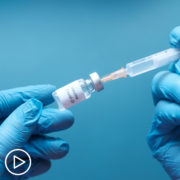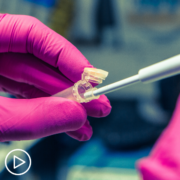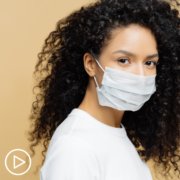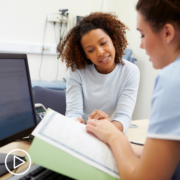NCCN Guidance on Safety and Effectiveness of COVID-19 Vaccines for Cancer Patients
NCCN Guidance on Safety and Effectiveness of COVID-19 Vaccines for Cancer Patients from Patient Empowerment Network on Vimeo.
Is the COVID-19 vaccine recommended for people living with cancer? Dr. Erin Roesch shares recommendations from the National Comprehensive Cancer Network (NCCN) for those undergoing cancer treatment, including guidance on mask wearing and advice for family members.
Dr. Erin Roesch is a breast medical oncologist at the Cleveland Clinic. Learn more about Dr. Roesch here.
Transcript:
Katherine:
Many cancer patients have questions about the COVID vaccine. Is it safe? Do we need to continue wearing masks? Here to address these questions is cancer expert, Dr. Erin Roesch. Dr. Roesch, would you introduce yourself?
Dr. Roesch:
Hello. And thank you for inviting me to participate in this very important conversation. My name is Erin Roesch. I am a breast medical oncologist at Cleveland Clinic.
Katherine:
Excellent. Thank you so much for joining us today. I’d like to run through a list of concerns that cancer patients have about vaccines in general and the COVID vaccine specifically.
So, let’s start with a basic question. Should people get vaccinated if they have cancer?
Dr. Roesch:
Yes. All individuals diagnosed with cancer should get the COVID-19 vaccine as recommended by the National Comprehensive Cancer Network or NCCN.
An immunocompromised state makes many people with cancer at higher risk of serious COVID-19 illness. Those who are vaccinated are less likely to become sick with COVID-19. And, also, vaccinated people who do get COVID-19 are much less likely to become seriously ill.
I would also mention that those living in the same household as a person diagnosed with cancer and caregivers or other close contacts should also get vaccinated.
Katherine:
Another common question is whether people with cancer should wait for any reason to get the COVID-19 vaccine.
Dr. Roesch:
Most people with cancer should get the vaccine as soon as they can with a few exceptions according to NCCN.
People in the process of receiving stem cell transplant or cellular therapy should wait at least three months after they finish treatment to get vaccinated.
Those diagnosed with certain forms of leukemia should also wait a few weeks after receiving treatment to allow their immune system to recover so the vaccine can be effective.
It’s not been clearly defined exactly how chemotherapy affects responses to COVID-19 vaccines. But some data suggests that immune responses may not be as robust. However, it is still recommended that those receiving chemotherapy and also immunotherapy and radiation should get vaccinated whenever they can.
Katherine:
I think a lot of people are concerned too about whether one vaccine is better than another. What would you say to them?
Dr. Roesch:
And that is a common question that I often get in my clinic. And I advise my patients to receive or take whatever vaccine they are offered.
We don’t really have any studies or data at this point suggesting one being better than another in cancer patients.
Katherine:
Some people are wondering if the vaccine can give a person COVID-19. How would you address that?
Dr. Roesch:
I would say that as none of the currently available vaccines are made with a live virus, the vaccine itself can’t give a person COVID-19. By getting vaccinated, actually, those who are immunocompromised are really helping society to prevent the spread of COVID-19. Immunocompromised people who get COVID-19 may be more likely to infect others due to prolonged shedding of the virus after infection.
Katherine:
What about side effects? Are the vaccine’s side effects worse for people with cancer?
Dr. Roesch:
No. Side effects do not appear to be worse for those diagnosed with cancer. Results to date suggest that the vaccine’s side effects in people with and without cancer are really no different.
These side effects, as we have seen, may include arm soreness, rash, fatigue, chills, fever, headache, for example.
Katherine:
And, finally, can cancer patients stop wearing a mask after they’ve been vaccinated?
Dr. Roesch:
Cancer patients should continue to wear a mask post-vaccination. Many people with cancer may have a harder time actually fighting infections and may not respond as well to vaccines. So, people diagnosed with cancer and their close contacts should get vaccinated and then continue to follow precautions, which include wearing masks, social distancing, hand hygiene.
Katherine:
Is there a certain length of time that people need to continue wearing a mask after being vaccinated?
Dr. Roesch:
At this time, I would recommend patients continue to follow the CDC guidelines that are currently in place. And at this point, I don’t think we have a projected end time for that yet.
Katherine:
Is there anything else you’d like to share with cancer patients who may be concerned about vaccinations?
Dr. Roesch:
I would encourage those diagnosed with cancer to not only themselves get vaccinated but to also really voice and stress the importance of vaccination to those that surround them, including, again, members of their household, close contacts, and even beyond their inner circle.
I would also advise people to try and avoid letting the concern of possible side effects related to the shot deter them from getting it. The symptoms of COVID-19 can be much worse and potentially serious for some compared with the relatively minor side effects that we’ve seen with the vaccine itself.
I also would mention I’ve had personal patients that have expressed concern about functioning of their immune system while receiving chemotherapy and how this might affect their response to the vaccine. I do emphasize to them that even though responses might not be as strong as they may be in the absence of active treatment, I feel like the potential benefits of the vaccine still outweigh the risks in my mind.
Katherine:
Thanks so much for joining us today, Dr. Roesch.
Dr. Roesch:
Thank you for having me.









